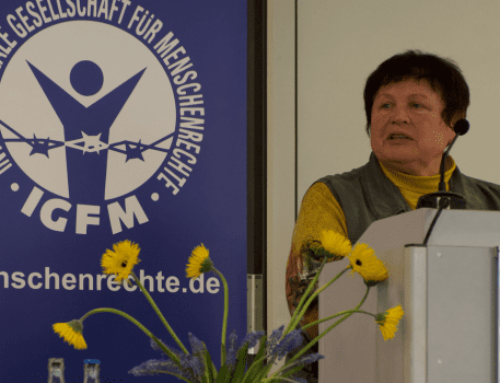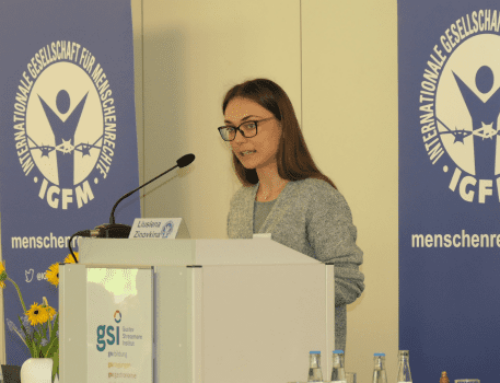
“As a human rights defender in exile, I have experienced death threats and assassination attempts, smear campaigns and pressure on close relatives.”
Bonn, 20. April 2024
This is the German transcript. You can find the video recording on our YouTube channel as well as linked in this article.
Parliamentary elections were held in Belarus in February 2024, but the human rights situation continued to deteriorate during the election process. The only independent candidate, Dmitry Kuchuk from the liquidated Green Party, who took the risk of running independently and not on Lukashenko’s lists, was denied registration for absurd reasons.
On 16 February 2024, the anniversary of the death of Russian opposition leader Alexei Navalny, Dmitry Kuchuk laid flowers in front of the Russian embassy to commemorate him. He was subsequently arrested and charged with participating in an unauthorised event. Dmitry Kuchuk has been in custody ever since.
The elections took place without independent observers and under considerable pressure and human rights violations.
Officially, there are currently 1615 political prisoners in Belarus, including 188 women and 6 children. Among them are 19 people who have been forcibly psychiatrically treated. Of the 1615 people, 208 have underage children who have stayed at home, with both parents imprisoned in some cases. In addition, more than 1,200 children are at risk of being separated from their families because their parents are actively involved in society and participate in protests.
In our opinion, the above number of political prisoners does not reflect the actual number of political prisoners in Belarus and is underestimated for the following reasons:
According to the data provided, between 9 August 2020 and 1 July 2022, more than 11,000 criminal cases related to extremist activities were initiated by the Investigative Committee. All of these cases of “extremist orientation” are politically motivated and often result in prison sentences. In addition, human rights activists report that in the first half of 2023, a further 364 criminal proceedings were initiated for “extremism” and 102 sentences were handed down. The maximum sentence for “extremism” is 25 years in prison. Currently, around 13,000 criminal proceedings have been initiated in connection with extremism.
Since 2020, the overall statistics on the number of people imprisoned in Belarus have been secret and not publicly available. The latest available data on the number of detainees in Belarus dates back to 2019, when the figure was 32,500 people. The categorisation of the statistics is likely to indicate a significant increase in the number of detainees, and the Belarusian authorities do not want to draw the public’s attention to the growing number of people in detention centres. There are also numerous reports of overcrowding in cells from former political prisoners.
Relatives of persons arrested on political charges (of which “extremism” is only one of many) are reluctant to publicly report the arrest of their relatives for fear of additional reprisals and pressure, including the risk of their own arrest (there have been cases of law enforcement officials arresting relatives as a form of “revenge”), or for fear for the life and health of the detained relative in pre-trial detention. When discussing the number of political prisoners, it must therefore be taken into account that the inclusion of a political prisoner on the list of political prisoners often depends on the active civic engagement of their close relatives and their willingness to communicate with human rights defenders.
In addition to the “extremism” jurisdiction, the Belarusian authorities actively use more than a dozen other articles of the Belarusian Criminal Code, including those related to unauthorised mass events, as well as articles of the Tax Code.
To this day, Belarus has no independent judiciary, no independent bar, no independent prosecutor’s office, no independent parliament, and there is no separation of powers. The country has the KGB (Belarusian secret service) as its political police. The Belarusian regime actively uses all methods to exert pressure on the opposition – from the abduction of children to hospitalisation in psychiatric clinics. The Belarusian regime also has a practice of taking relatives of prominent opposition figures, activists and human rights defenders hostage.
The general situation in detention centres in Belarus:
Belarusian political prisoners usually wear yellow badges. Sometimes political prisoners who actively resist the prison administration are also marked with red colour.
All prisoners, whether imprisoned for political or non-political reasons, are subjected to a range of ill-treatment, including torture, brutal treatment, denial of medical care, physical violence from the moment of arrest, sleep deprivation, cold and isolation, threats of sexual assault, manipulation and imposition of “low social status” among fellow prisoners, among other forms of ill-treatment. Women are also deprived of or denied menstrual hygiene products. There are reports of the use of so-called “sweatboxes” – cells that house prisoners who have been convicted under controversial sections of the penal code (such as paedophilia, rape, etc.) or who have violated the unwritten moral code of the criminal underworld. These cells are used by the prison administration to exert additional pressure on prisoners. The people housed in these cells are subjected to beatings and torture by fellow prisoners and are often victims of collective sexual violence. The “headlock” cell is usually used by the prison administration to break the resistance of prisoners and assign them a so-called “low social status” in the colony, which significantly impairs communication with other prisoners and negatively affects the conditions of detention in the colony.
It is difficult to obtain information about the state of health and living conditions of political prisoners, as relatives and lawyers are denied visits for months on end. There is no independent legal profession in Belarus and lawyers are often subject to confidentiality agreements. The system includes the revocation of licences and the arrest of lawyers defending political prisoners. Many lawyers representing prominent political prisoners have been forced to leave Belarus under threat of reprisals, including the withdrawal of their licences. Since 2020, the number of state-appointed lawyers in Belarus has fallen from 2,200 to 1,650, with around a hundred lawyers having their licences revoked and eight of them being prosecuted.
There is forced labour in prisons, which can be described as a system of state slavery: Prisoners work under harsh conditions but receive only 5, 10, or 20 cents per month for their labour. The companies in which the prisoners work are integrated into the system of the Ministry of the Interior, with a significant proportion of the products being exported. This includes cases where IKEA has manufactured its products in Belarusian detention centres. The issue of products manufactured by forced labour in prisons and exported to the West is still largely unexplored.
For the slightest offence and often for no reason at all, political prisoners are taken into penal isolation, where they can remain for months, although Belarusian criminal law limits the stay in such a cell to 10 days. It is a small room in which the bench and table are welded to the floor and the bed is attached to the wall. It is cold, there is no mattress and there is nothing to do. The only items allowed in the isolation cell are a toothbrush, toothpaste, toilet paper and soap. The colony staff provide slippers instead of normal shoes, a robe labelled “punishment isolation cell” without a collar and a small towel. That is all the prisoner has. The isolation cell usually consists of a table and a bench, which are usually attached to the floor, a bed, which the colony staff remove from the wall at night, and shelves on the wall. Letters and parcels are not allowed. Meals are served three times a day and inspections are carried out at least twice a day, during which the cell and the inmate are searched. Prisoners must state their first name, surname, patronymic, the article under which they were sentenced and whether they are entered in a register. Sleeping in the isolation cell is difficult: there are no pillows, blankets or sheets – just bare boards. Sometimes the floor is flooded with bleach. The colony administration can send a prisoner to solitary confinement for any violation of the internal rules. Sometimes prisoners resort to extreme measures to protest against the isolation conditions, such as slitting their veins or cutting open their stomachs. Political prisoners have been known to cut their veins to protest against lawlessness, cruel treatment and torture.
There is a clear trend of a complete information vacuum and isolation of the most prominent political prisoners since around February 2023, suggesting that this additional pressure is organised and centrally controlled “from above”. It was also revealed that practically all known political prisoners have been tortured and subjected to additional pressure since then: They are placed in penal isolation or in chamber-like rooms under various pretexts.
It is important to emphasise a key feature of Belarusian repression: Once a person has fallen into the clutches of the system, they are repressed several times using different methods, as the system never stops with its repressive measures. Once a person has served their sentence, further criminal proceedings are initiated, such as the second, third and so on. At the same time, pressure is exerted on their families and relatives.
The Belarusian regime also carries out extraterritorial repression against activists, especially human rights defenders who are abroad. As a human rights defender in exile, I have experienced death threats and assassination attempts, smear campaigns using various unexpected methods and pressure on close relatives. As recently as March 2024, the Belarusian regime opened a new criminal case against me for my alleged participation in the 2020 protests (in which I did not participate), which could result in a cumulative sentence of up to 22 years in prison. I continue to be categorised as a terrorist in Belarus, which is punishable by death.
The regime is making considerable efforts to demoralise and obstruct even those who have managed to escape and are abroad. Unfortunately, neither I nor my colleagues feel safe abroad. I would like to remember my colleague, the Belarusian human rights defender Vitaly Shishov, who was killed in Kiev on the eve of the war. Vitaly Shishov was actively helping Belarusian refugees in Ukraine. His murderers have still not been found. The Belarusian colonel Oleg Alkaev, who helped to investigate the abductions and murders of Belarusian opposition members by the Lukashenko regime, spent the last years of his life under the protection of the German police after several attempts were made on his life in Germany. It is clear that it is very difficult to live under such pressure. That is why many activists and human rights defenders give up the fight and try to hide and stop all activities because they are very tired.
On 16 February 2024, opposition leader Alexei Navalny died in Russia (although we believe he was murdered). His death had a significant impact on events in Belarus. Lukashenko was encouraged that he, like Putin, can kill political prisoners.
On 20 February 2024, just four days after Navalny’s death, my colleague, human rights defender Igor Lednik, died in a Belarusian prison. Igor was the seventh political prisoner to die in custody since 2020. He was 63 years old. Like me, he was branded an extremist, and his posts on social media were categorised as extremist material, just like mine. He was sentenced to three years in prison for “slandering the President of the Republic of Belarus”. The basis for his prosecution was a publication entitled “The internationally recognised neutrality of Belarus – a guarantee of security in the OSCE region”. Igor Lednik worked tirelessly to gather evidence of Alexander Lukashenko’s crimes and he had hoped to see Alexander Lukashenko in the dock in The Hague. In memory of human rights defender Lednik, I believe that we must continue our human rights work and not give up, otherwise there will be many more deaths in prisons.
On 9 April 2024, political prisoner Alexander Kulinich died in Brest remand prison. He was arrested on 29 February 2024 and was to be tried for insulting Alexander Lukashenko. His trial was due to begin on 16 April 2024. He was the eighth political prisoner to die in a Belarusian prison.

Lev Ponomaryov and Olga Karach in the audience at the 52nd Annual Conference of the IGFM
Today, of course, all attention is focussed on Ukraine, and that is understandable. However, it is also important to look at developments in Belarus. My biggest concern is that Belarus will remain under Russian control and in Vladimir Putin’s sphere of influence even after the end of the war in Ukraine. It is clear that as long as Putin is in power in Russia, he will support Lukashenko in maintaining his authority in Belarus, and in return Alexander Lukashenko will support Putin in any war.
I think we should not only talk about Ukraine, but also about the need for a new security architecture for the whole region. Without a democratic Belarus, it is impossible to restore peace in our region and win this war. Currently, Alexander Lukashenko is actively preparing for war by conducting military exercises in Belarus. It is only a matter of time before the Belarusian army invades Ukraine. If I said 2022-2023, “if the Belarusian army invades Ukraine”, it is now clear that it is not a question of “if”, but rather a question of “when”.
This is why the work of Belarusian human rights organisations is so important, because they are on the front line against the attacks of the Belarusian regime, even in exile. And my greatest hope is that we are not alone in our fight for human rights in Belarus, that we will continue to fight for an end to the terror in Belarus, for the release of our political prisoners and for a peaceful and safe return to Belarus. And we will not give in, despite all the repression and pressure.
I would therefore like to thank the ISHR for its systematic and great work to protect human rights and support Belarusian and Ukrainian refugees in Lithuania. My special thanks go to Katrin, who has become a guardian angel for people fleeing war and terror, and to the IGFM group in Wittlich, whose help in Lithuania is simply invaluable. Last year, we received 75 tonnes of humanitarian aid from IGFM-Wittlich, organised by Katrin and the entire Wittlich IGFM team. We helped more than a thousand Ukrainian and Belarusian families with clothes, shoes, furniture, bed linen, toys, medicines etc. Special thanks to Catherine for her help in organising a transport caravan from the Rotary Club, which came to us in September last year and brought a lot of food and children’s clothes.People fleeing war and terror arrive in Lithuania without any belongings and without even the most basic necessities. At best, they have a small bag on their backs. They are all very depressed and desperate because they have not only lost their homeland, but also the place of their memories, their past, what they loved and what brought them joy. Many people have the feeling that their lives will not get any better. Our humanitarian work is not just about helping refugees to get what they need. Very often it is also about psychotherapy, networking, teaching people how to organise themselves and many other important support processes. But without the help of the IGFM, especially without the help of the IGFM – Wittlich and Katrin, we would not be able to help them.
Thank you, IGFM, for all the life-saving work you and we do together.








Leave A Comment